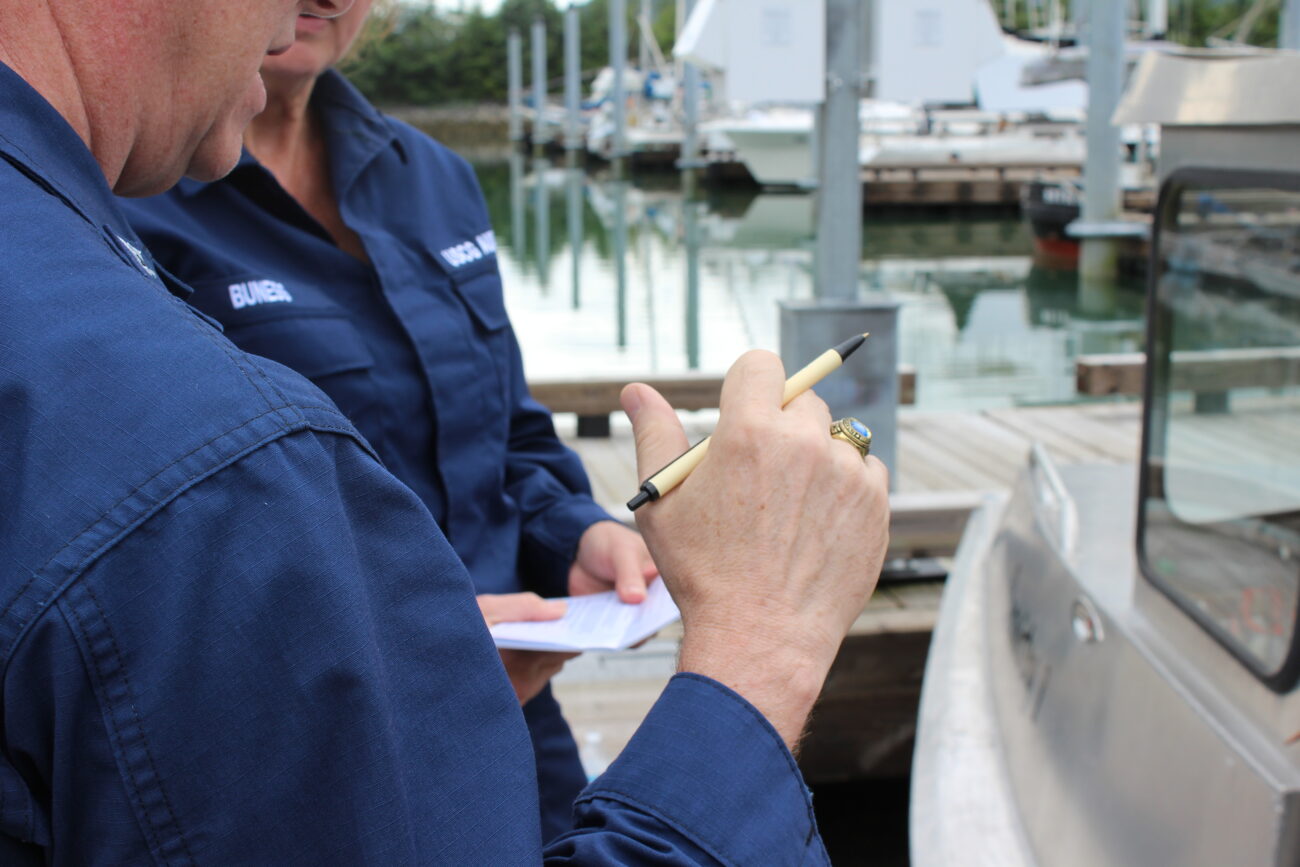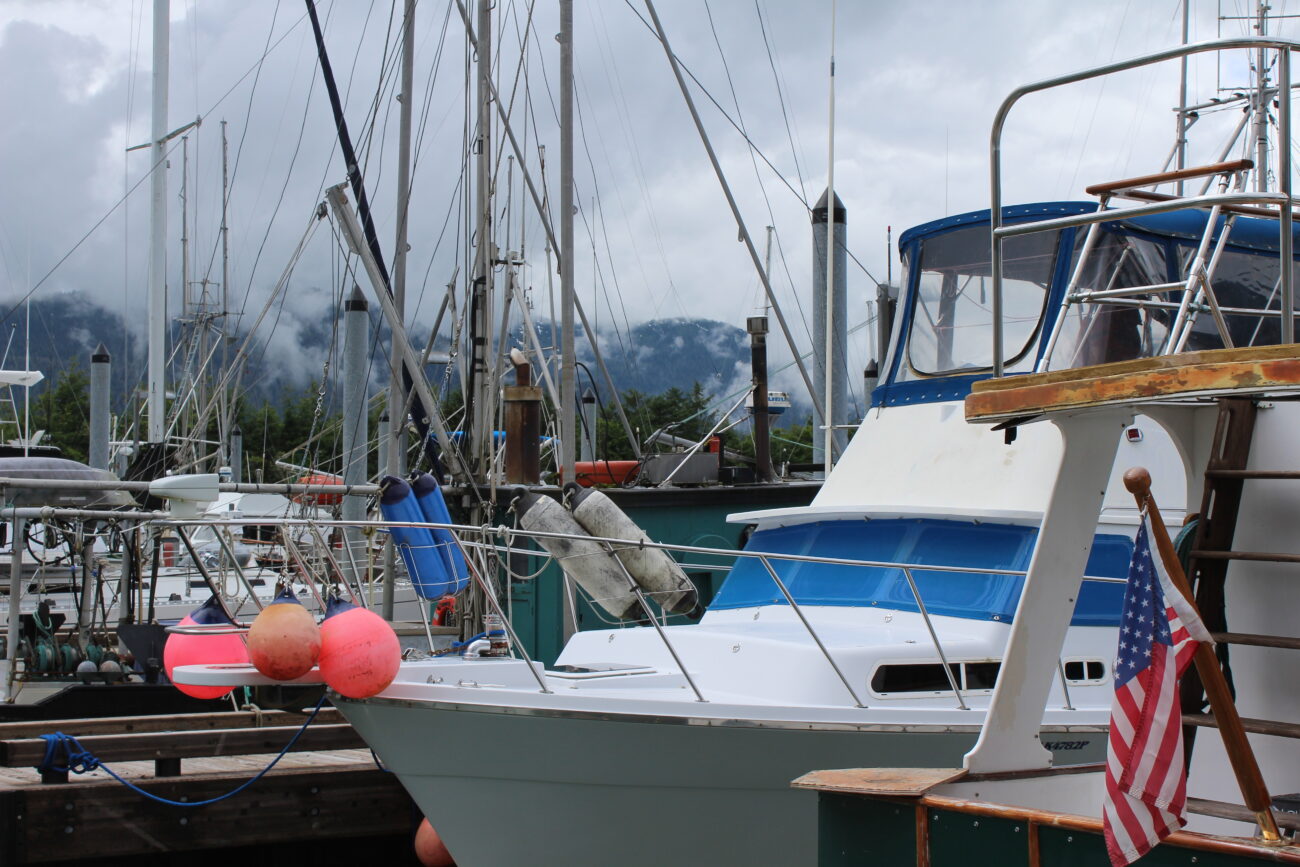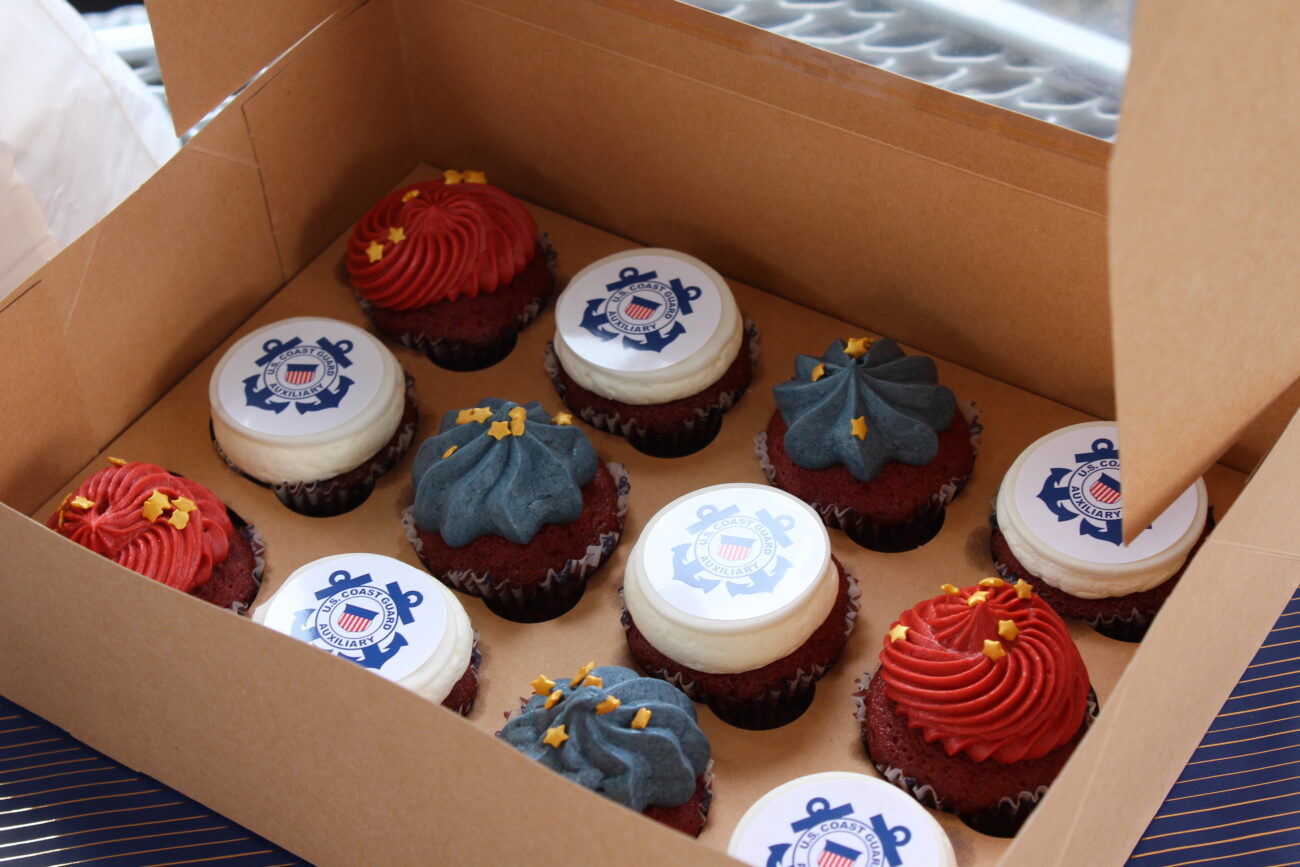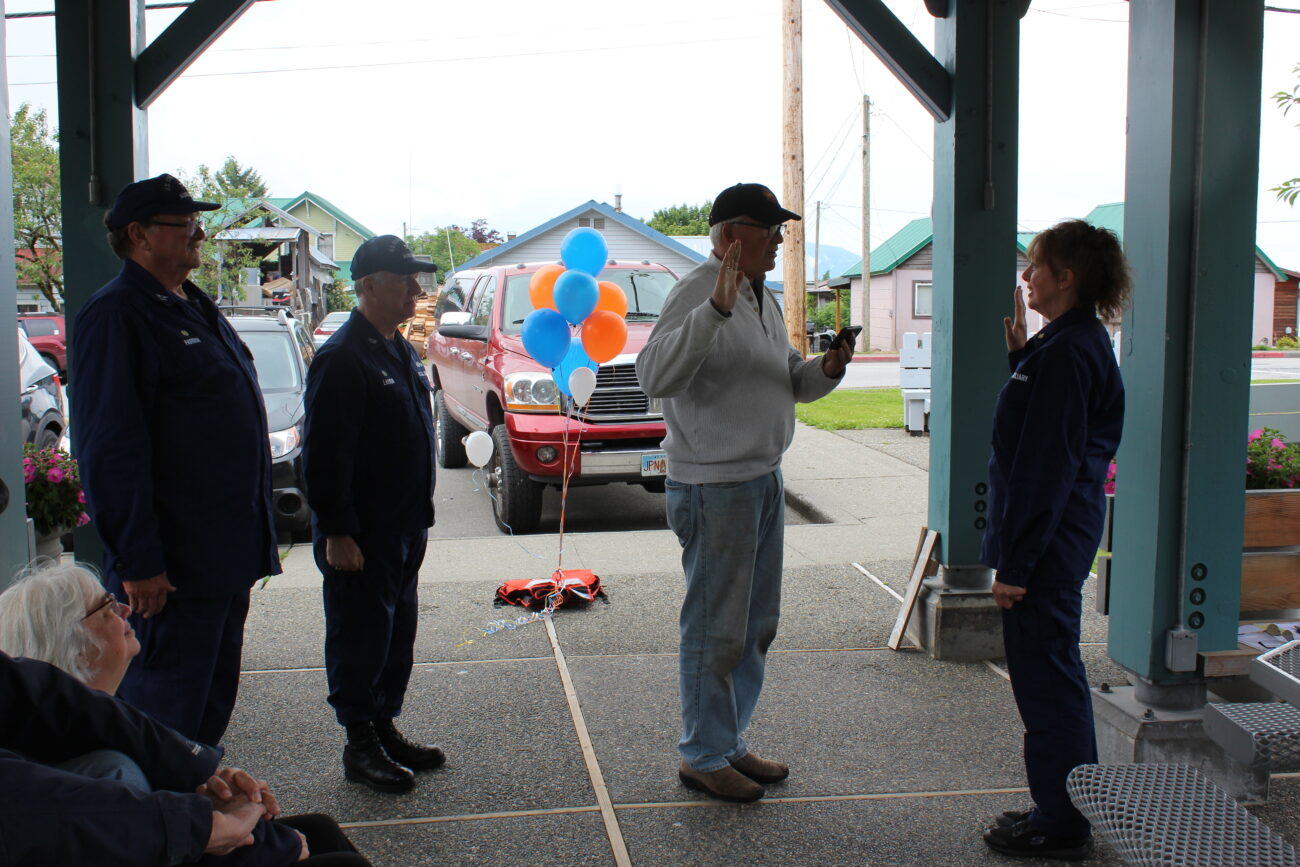
(Sage Smiley / KSTK)
It’s been decades since the Coast Guard has had a volunteer civilian detachment in Wrangell, but one Wrangellite is trying to change that.
Coast Guard Auxiliary Commander David Larkin is wearing black military boots and a navy-blue baseball cap that reads ‘U.S. Coast Guard Auxiliary.’ Both of his navy blue uniform lapels have what appear to be eagle patches. He holds a clipboard and stands on one of the floats at Wrangell’s Shoemaker Harbor.
“So the first thing when you walk up towards the boat is you just sort of look at the overall condition as you’re coming up to the boat. Okay, if it’s underwater, you turn and walk away,” he says to fellow Auxiliarist Liz Buness, who is currently Wrangell’s only sworn volunteer of the U.S. Coast Guard Auxiliary. She sports a similar, deep blue uniform. “So we’re walking up and it’s not underwater. Partially, but not completely.”

(Sage Smiley / KSTK)
They’re doing vessel inspections. And it seems the bilge pump on Jim Anderson’s 20-foot boat, a 1981 Svendsen, has stopped working.
Buness has to board the boat to check the pressure of the fire extinguisher. “I hope I don’t sink the boat,” she laughs.
Together, Larkin and Buness make their way through their checklist.
“Electrical systems,” reads Larkin, “He turned stuff on. I didn’t see sparks. Looks pretty good. The person the water kit: He just showed us he’s got the gaff hook right there. That’ll get somebody aboard.”
Larkin uses some moments for teaching, explaining what can and can’t fit within the Coast Guard’s vessel safety requirements.
“Do you know about when you need to report an accident?” he asks.
“Immediately — within 24 hours,” Anderson responds.
“That’s a good answer right there,” Larkin says, “And that is enough of an answer. They don’t have to go into what are the, you know, dollar limits. If he just knows ‘I’ve got to report it right away.’ If he calls up and it doesn’t meet the requirement, they’ll say ‘You don’t need to tell us.’ So that’s good.”
Larkin visited Wrangell earlier this month, along with the Coast Guard Auxiliary’s Chief of Staff for Alaska to try and drum up local interest in joining the volunteer branch of the Coast Guard.
Coast Guard Auxiliary can do vessel inspections, but also help educate about boating and life jacket safety, respond to pollution, spearhead harbor cleanups. Ham radio operators in the Coast Guard Auxiliary can relay messages when VHF towers are down.
Auxiliary members can also volunteer their boats to be used as CG vessels if there’s a need, to do little missions like checking navigation aids or looking for pollution.
For now, the Wrangell detachment of the Auxiliary is a party of one, with Buness holding down the fort in town, and attending meetings of the group in Ketchikan.

(Sage Smiley / KSTK)
Marion Parrish — the Auxiliary chief of staff — explained at a meet-and-greet event on July 14 that the military branch needs civilian volunteers of all sorts — not just to help with vessel inspections: “Right now the Coast Guard has a definite need for doctors, medical people, chaplains, interpreters, cooks.”
As an example, Larkin relates how an auxiliary cook on the Coast Guard cutter Kukui allowed the ship to respond to deadly landslides in Haines last winter.
“Had she not agreed to go, they could not have gotten underway because they were minimum staffing,” Larkin explains.
The Coast Guard Auxiliary was established by Congress in 1939 when a group of yacht owners in California pushed for a volunteer arm of the branch to be established to allow them to help in the lead-up to U.S. involvement in World War II. Today, it acts as the Coast Guard reserve. Larkin explains the auxiliary is authorized to carry out basically any mission the Coast Guard is, with one exception.
“We don’t carry guns and write tickets. And we don’t do military operations,” Larkin says. “So I’m not likely to get sent to Iraq again, which is fine with me.”
As Larkin describes it: In Alaska, there’s not a lot of Coast Guard, but there’s a lot of water and a lot of boats. He adds that anyone can join. The requirements are basic: “You have to be 17 until the end of life, there’s no upper limit. There actually is nothing in the requirements that requires you have a pulse.”
Buness says she’s wanted to form a Wrangell flotilla — a stand-alone branch of the Coast Guard Auxiliary — since she met members of the Coast Guard while working as a stewardess on the Columbia.
“I thought: I think we could do that in Wrangell, I think we can pull this off,” Buness told interested Wrangellites at the meet-and-greet earlier this month. “So yeah, I think it would be a very, very positive thing to have here. We just need people to join up.”
For now, though, she’s the only sworn member of the Wrangell detachment, and she hasn’t been official for very long. In fact, she was sworn in at the meet and greet.

(Sage Smiley / KSTK)
But there’s local interest.
“I used to be very involved in scouting,” says Shirley Wimberley, who explains she is especially interested in the partnership between the Coast Guard Auxiliary and the Boy Scouts of America — the Sea Scouts.
“I said, ‘Oh, that would be fun!’ So that’s kind of how I’m coming into it. But I’m excited about some of the other stuff. I mean, I didn’t realize you get to do all kinds of stuff,” Wimberley added.
For Pastor Sue Bahleda, she says she already has some history helping out the Coast Guard in her position as a religious leader: “When we were in Juneau, I had sort of an unofficial relationship with the Coast Guard because our church was right across the street, from their offices. So we provided some safe sanctuary space for times when the Coast Guard needed that.”
For her husband Bill, it’s a logical extension of being a boat owner.
“We have a boat,” Bill Bahleda says, simply. “And everyone who’s had a boat has had contact with the Coast Guard, so we’re already broken in to the process. Why not help out? If you can help you should.”
It does cost some money; members of the Coast Guard auxiliary are responsible for buying their own uniform. There are also annual dues. Larkin says for his flotilla in Juneau, that’s about $50 a year. Meetings and training happen once or twice a month.
Anyone interested in more information or in joining the Wrangell Detachment of the Coast Guard Auxiliary can call 907-305-0014 or email gocoasty2021@gmail.com.
Get in touch with KSTK at news@kstk.org or (907) 874-2345.









